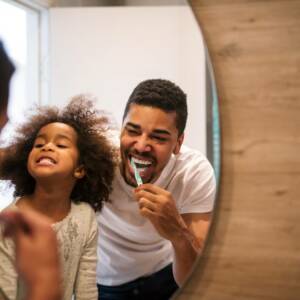
Don’t panic! You’re not alone! Read on to understand why this may be the case and how to help your sensory child with toothbrushing.
This is really common in the sensory world, but clearly, something you want to find a solution to. We all know the importance of good dental hygiene and health. Not brushing our teeth leads to bad breath at best, cavities and pain at worst.
This can be a challenge to figure out, some maybe orally under sensitive (Hypo sensitive). Therefore they may feel on edge about brushing and anything to do with the mouth. You might find they drool or overfill their mouth. Conversely, they may be oversensitive (Hypo sensitive) and find brushing teeth painful and overwhelming. A mouthful of water, toothpaste and a full brush can just feel too much.
There may be other signs and challenges associated with oral sensitivity. For Example an aversion to eating, or certain food textures. So given the choice of battling either nutrition and eating or brushing teeth, then eating comes wins every time.
Whatever the reason, it is something you will no doubt be keen to find a solution to. Now I am no therapist, and so the following is not a therapeutic plan, rather a series of suggestions to try, a collection of things we have heard from our community over the years have helped.
The above is not a magic wand, like any change it takes, patience, perseverance and a good chunk of praise and encouragement. You can also speak to your dentist, occupational therapist or other healthcare professionals who will be able to suggest other options you could try.
Or join our Sensory Support Community on Facebook, you won’t find a friendlier bunch, post there and I am confident you will be inundated with tips and support, hope to see you there!
Sensory Matters Podcast
Free Sensory Support Community
Can Chewigems Help Keep Your Teeth Clean?